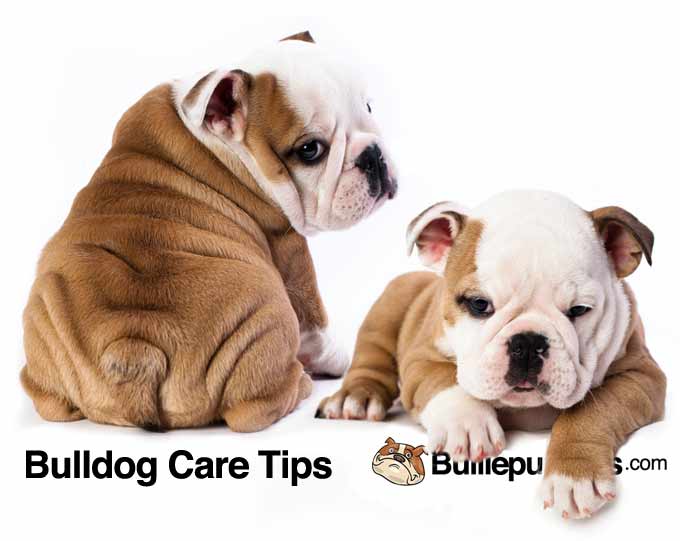
Bulldogs are low-maintenance canines. They typically only need a thorough brushing once every week to two weeks. Start this routine when your dog is a puppy and be certain to reward him with a doggy treat when the grooming is over.
A typical bulldog shouldn’t need to be bathed more than once or twice a year, unless he gets dirty or start to smell. It is important to only bathe him when he really needs it and use a sebolytic shampoo when you do. Bathing can strip away the natural oils that protect his skin. To avoid causing his skin to dry out or become damaged, use a special moisturizing dog shampoo whenever you bathe your dog and thoroughly rinse away the soap. Wash his head last to avoid getting any of the shampoo in his eyes.
Exercise
Bulldogs are not lazy. In fact, they enjoy exercise just as much as the next dog and it is one solution to stopping a chewing problem that develops because of boredom. To help your dog stay at a healthy weight and stave off many of the age-related diseases as long as possible, it is important to ensure your bulldog gets plenty of exercise.
Avoid over-exercising your dog, especially when he is a puppy. Start with a short work and then build up to a level of activity that best suits your bulldog. Also, avoid exercising your dog for at least an hour after meals or the hottest part of the day. Waiting to exercise your dog after meals will prevent bloat. If you exercise your dog during the heat of the day, he might get heatstroke which can be fatal.
If your dog gets heatstroke, take him to the vet as soon as possible. Don’t try to treat him at home because he may be in shock. The vet can treat him properly and make sure he is alright before sending him home.
Feeding
Puppies should be fed four times a day and then gradually weaned to two feedings per day. Consult with a vet or a bulldog puppy chart for information about how much to feed your dog. Because of their unique facial features, bulldogs can make quite a mess during feeding times. Make sure you put down newspaper or feed them outdoors to save on cleaning time and effort.
Tail Care
A common problem bulldogs have is with their tails. When it is hot outside, their screw tails may become overly moist and cause irritation. If that occurs, bathe the tail with water mixed with disinfectant. Dry thoroughly and apply talc powder. If infections occur frequently, you may want to consider having the tail removed by a veterinarian.
Paws
Bulldogs are susceptible to developing lesions or cysts between their toes, which can make it uncomfortable or painful to walk. They are more common on the forefeet where the bulk of the dog’s weight rests. It is unknown at this time what causes these cysts. It may be that the hair between the dog’s toes latches onto dirt and other foreign objects that get pushed under the pads and aggravate the skin in the area.
To treat the problem, soak the foot in a mixture of warm water and a spoonful of sea salt. Dry thoroughly and then apply a little bit of iodine to the skin. To prevent future problems, keep the hair between toes trimmed.
Bulldog Ears
Bulldog ears are shaped like a rose which allows air to circulate. Typically, bulldogs don’t have ear problems as long as they are kept clean. Dirty ears can be cleaned using cotton balls and warm water.
If your dog is scratching at his ears a lot, he may have mites. Mites cause the ears to fill with dark brown, smelly wax that may flake. There are several ear treatment products on the market that will fix this issue.
Other issues that cause ear scratching or head shaking include yeast infections, allergies, or trauma. These issues should be checked out by a vet.
Anal Glands
Sometimes the anal glands will cause problems for your bulldog. The ducts in the gland will become blocked due to infection, injury, or tapeworm infestation. This causes them to become obstructed and subsequently irritated. The manifestation of this is the sight of your dog scooting around on his bottom or licking his hind legs.
Anal glands should be checked every so often. If they become infected, take your dog to a vet for treatment.
Doggie Breath
Bad breath is typically caused by tartar buildup. It may become worse as your dog ages. There are several devices that will help you brush your dog’s teeth as well as chew toys that get rid of tartar buildup. Your vet can recommend some effective products.
Parasites
Fleas are your dog’s worst enemy because they are easy to catch and itch like crazy. Other parasites that may try to hitch a ride on your dog are mites and ticks. All of these bug infestations can be prevented through the used of medicated collars or spot-on products.
Bulldog puppies and adults should be treated for worms on a regular basis. Specially-designed medication kills the internal parasites that can make your dog sick like hookworms, roundworms, and heartworms.